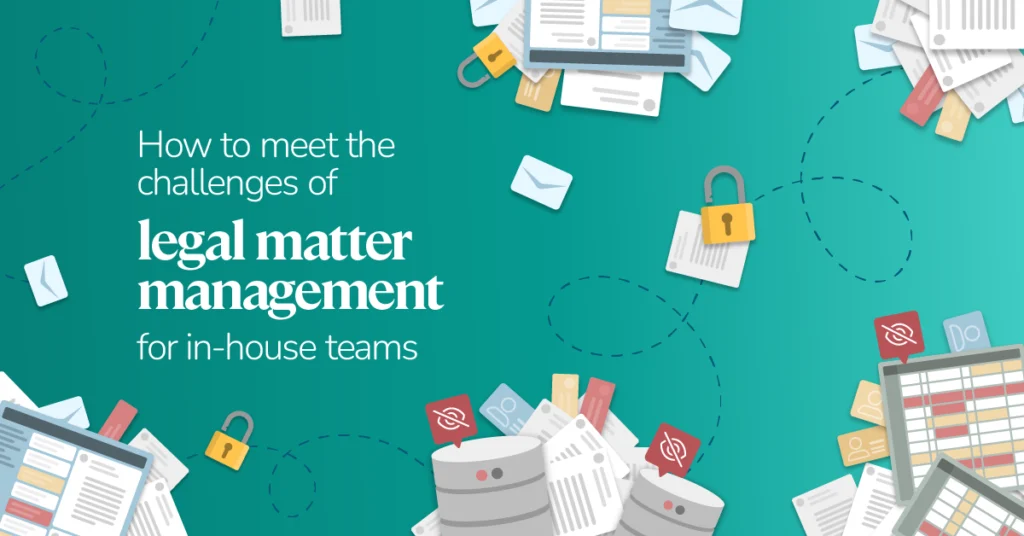How to meet the challenges of legal matter management for in-house teams

Where and how we work has become a worldwide conundrum in recent years, and in-house legal teams are discovering that like most other industries, they are expected to do more with less in both human and financial terms. The issue of how work is done efficiently and with efficacy, and with concerns such as global time zones and remote office locations added to the mix, mean the challenges facing in-house counsel are as immense as they are intense.
These days, corporate legal teams are finding themselves under increasing pressure – as more work is being moved in-house due to increased regulation, litigation, and complex technologies. Expectations include managing increasingly higher volumes of complex legal matters, and with excessive workloads cited as the top challenge facing legal teams in 2024, it’s apparent that the problem is growing.
The issue isn’t the nature of the work itself – rather, it’s the lack of centralized systems and processes for managing the flow of work which is getting in the way of legal’s ability to deliver services at scale and reflect its own value back to the business. In other words, poor matter management has become a genuine concern.
What is legal matter management?
Put simply, matter management is the process by which legal teams handle, organize, and track all the work they are responsible for. For in-house teams, this includes managing requests, projects, documents, deadlines, communications, billing, and workflows. The goal of matter management is to streamline operations, improve efficiency, and ensure compliance while enabling legal professionals to focus on legal and strategic work.
Matter management is one function of in-house legal teams where the devil really is in the details – and capturing this knowledge is key to running an efficient and effective in-house legal team.
Legal matters defined
In corporate legal work, a legal matter is any issue, project, or dispute subject to laws and regulations that requires legal resolution. Traditionally, the term has been defined narrowly, focusing on major tasks like contract negotiation, dispute resolution, and regulatory compliance.
However, in-house legal work is much broader, encompassing everything from minor administrative queries to complex advisory requests. Therefore, it is more accurate to view a legal matter as anything requiring legal involvement.
Key objective of legal matter management
The overall goal of matter management is to support legal operations, to optimize productivity, maximize efficiency and provide visibility while mitigating risk in support of legal delivering value as a strategic business partner and enabler. As a result, the means to manage matters, or the tools and/or technology at play is inclusive of all the cogs that keep matters in motion, starting with a business request for legal support, through to how the work is prioritized and managed, and the outcome. This is broken into:
- Intake and triage
- Planning
- Task management, collaboration, and communication
- Document management
- Reporting
Legal matter management challenges
According to the 2024 In-house Legal Technology Report (LTR), efficiency is the number one priority for in-house legal teams – but with 77 percent of respondents concerned that time spent on repetitive manual tasks detracts from their ability to deliver value, this goal is being repeatedly undermined by mountains of daily admin. And this is having a negative effect on the overall business.
In addition to affecting service delivery and reducing the ability to impact business goals, the time the legal function spends on manual administrative tasks, such as those identified in the section above, is costing businesses a significant amount of money. Taking the average cash salary of Senior Counsel in the US (USD $218,000 according to the 2023 ACC Law Department Compensation Survey), it could cost a business USD$817,500 per year for a legal team of 10 wasting three hours a day on manual and administrative tasks.
As legal teams are a critical component of commercial transactions and projects, the efficiency of the legal team should be a top priority for the wider business, not just legal. Addressing matter management challenges is the best place to start.
Matter management challenges:
Inefficiency
Here are some of the biggest sources of inefficiency for in-house legal teams:
- 71% spend over an hour a day searching through emails for work context.
- 81% spend over an hour a day on back and forth with the business.
- 70% spend over an hour a day manually managing their workloads.
- 66% spend more than an hour a day compiling assets for reporting.
While legal waste is one of the biggest factors getting in the way of effective matter management, it’s just one piece of the puzzle. Others include:
Scattered information
When you’re working from email, spreadsheets, or other disconnected software, a lot of time is spent trying to find the information you need to resolve matters, shifting it between systems, providing updates and tracking progress. This eats up time and leads to the risk of duplicated work – and much frustration.
Lack of standardized processes
Working without a centralized system doesn’t just hinder productivity and make progress clunkier, it has knock-on effects across the business. From messy approval workflows to inconsistent file naming conventions, jumbled processes get in the way of deadlines and increase security and compliance risk – not to mention missed opportunities to track data.
Lack of visibility
Disconnected systems of work make it tough to monitor what’s happening day-to-day within your team. This lack of visibility doesn’t just affect business continuity when staff go on vacation or leave – it makes it almost impossible to make data-informed decisions or accurately communicate value.
High risk workflows
Legal matters always involve sensitive data. Storing and moving this information between email inboxes and document management systems creates a dangerous vulnerability to data and security breaches – especially when you add unmonitored outside counsel processes into the mix.
Perception of legal
Against the backdrop of all these issues, it’s no surprise that legal often ends up perceived internally as a black box which slows down, rather than accelerates, business outcomes.
Lack of data to prove value and measure and improve legal operations
Data is all the information generated by your team’s daily legal workflows, both in-house and in collaboration with outside counsel and the wider business. Without a means to capture and measure data through key performance indicators (KPIs), it’s impossible to prove the value your team brings to the business.
Left unchecked, the cumulative impact of these challenges undermines the ability of legal to meet the demands at its door – increasing the running cost of the legal function whilst decreasing its perceived value to the business.
The solution – legal management software
Saving time and delivering more value to the business have become crucial issues for in-house legal teams. Which means it’s time to look at ways to do more with less and ensure that your approach is tailored to suit the needs of your in-house legal function.
Every hour lost to inefficient workflows adds up, slowing down service delivery and pulling you away from higher-value work. This translates into a heavy financial burden for your organization – one which can be quantified. With many teams still relying on multiple software solutions, significant opportunity also exists to consolidate tech stacks to optimize efficiency gain.
The good news is that there is a proven solution to matter management issues – legal management software.
Matter management software is a type of technology solution designed to help legal teams organize and manage their everyday workflows by capturing them as legal matters. Matter management software comes in a variety of types, which ideally should facilitate the end-to-end management of all your legal work, from intake to daily workflows and data insights – all channelled through a single source of truth.
Matter management software meets the challenges faced by today’s in-house teams and their businesses by delivering:
- Time savings and increased productivity;
- Better collaboration and communication;
- Enhanced visibility and oversight;
- Easier reporting and data-driven insights;
- Lower risk; and
- Happier teams.
From reducing costs to facilitating scalability and strategic engagement, it’s clear that better matter management results in better outcomes for both legal and the wider business. The question, then, is how to identify the right software solution to meet the challenges facing in-house legal teams and deliver improvements – and how to procure and implement it successfully.
To learn more about how to evaluate, procure, and implement a matter management solution, read our full guide to better matter management now.
The added benefit of consolidated solutions for matter, spend, and contract management
Solving matter management challenges is crucial for in-house teams, but there may be additional workflows which benefit from their own dedicated technology solutions, such as Contract Lifecycle Management and e-Billing and spend management solutions. If you are facing these challenges as well, a legal workspace that unifies matter, spend and contract management in one system may be your answer.
The 2024 In-house Legal Technology Report (LTR) shows that while consolidated solutions deliver clear efficiency gains, many teams continue to rely on multiple technology sources, with 42 percent currently utilizing four or more software vendors for their legal work.
This fragmented approach to legal technology is causing myriad pain points for legal teams – and impacting heavily on their efficiency. The biggest issues associated with current software usage all relate to problems associated with utilizing multiple tools – including time lost jumping between platforms, lack of integrations, and underuse of full functionalities.
Having a consolidated system, known as a ‘legal workspace’, has the major benefit of bringing together all the strands of the work your team does. LawVu’s legal workspace enables you to unite all your matter management workflows regardless of whether the work is being outsourced or not, so you can easily raise work and collaborate with external counsel while also digitizing and consolidating invoices and legal spend in one system with in-house matters.
To learn more about LawVu matter management and the LawVu legal workspace, book a demo today.
